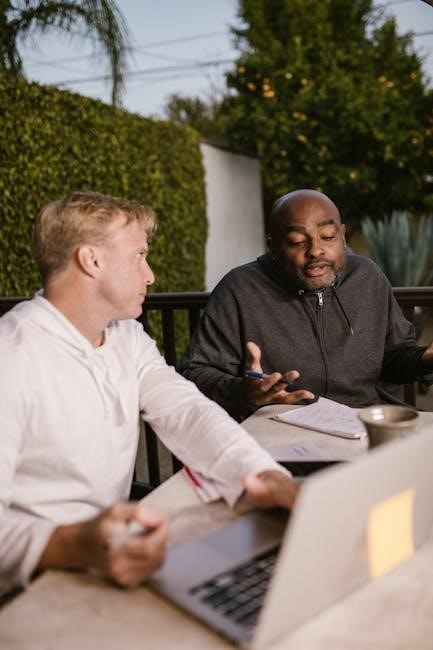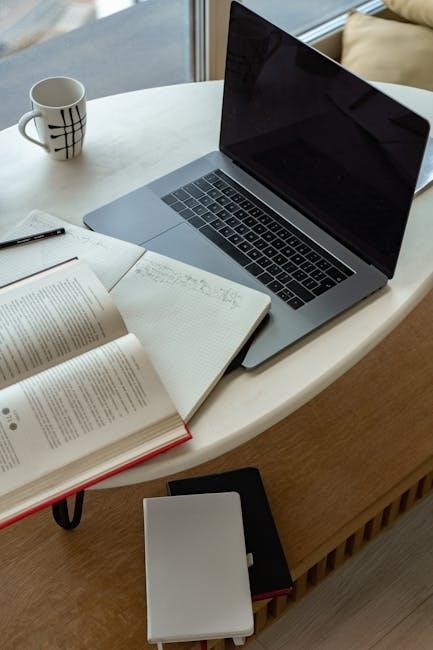Emailing college coaches is a crucial step in the recruiting process, allowing student-athletes to showcase their skills and express interest in a program. A well-crafted email highlights achievements, demonstrates enthusiasm, and establishes a professional connection. This guide provides templates, tips, and best practices to help athletes communicate effectively and make a lasting impression.
Importance of Effective Communication
Effective communication is essential when emailing college coaches, as it helps student-athletes stand out and make a strong first impression. A clearly written email demonstrates professionalism and respect for the coach’s time. By being concise and specific, athletes can showcase their skills, achievements, and genuine interest in the program. Poor communication may lead to misunderstandings or a lack of interest. A well-structured email reflects an athlete’s commitment to their sport and their ability to take initiative. It also highlights their understanding of the recruiting process and their readiness to engage with the coach. Strong communication builds trust and establishes a positive foundation for future interactions.
Understanding the College Recruiting Process
Understanding the college recruiting process is vital for student-athletes to navigate effectively. It begins with identifying potential schools, researching programs, and reaching out to coaches. The process involves creating a list of 10-20 schools that align with academic, financial, and athletic goals. Student-athletes should highlight their achievements in emails to coaches, demonstrating why they are a great fit. Following events or initial contact, sending thank-you or follow-up emails is crucial. Coaches appreciate concise, personalized communication that reflects genuine interest. The recruiting process requires proactive engagement, organization, and persistence, ensuring athletes present themselves as attractive candidates. A well-structured email is an essential tool in this journey, helping athletes stand out and build meaningful connections with coaches.
Key Elements of a Successful Email
A successful email to college coaches must include several key elements to ensure it is professional and effective. Start with a clear and concise subject line that includes your name, graduation year, and sport to grab the coach’s attention. The email should begin with a personalized greeting, addressing the coach by name. In the body, introduce yourself, mention your interest in the program, and highlight your academic and athletic achievements. Keep the message concise, focusing on why you are a good fit for their team. Always attach necessary documents, such as your resume or highlight reel, and close with a polite thank you and your contact information. Professionalism and clarity are essential to making a positive impression.

Understanding the Structure of an Email to College Coaches
A well-structured email to college coaches includes a clear subject line, personalized salutation, concise body highlighting achievements, and a professional closing with contact information and attachments.
Crafting a Strong Subject Line
A strong subject line is essential to grab the coach’s attention. Keep it concise and specific, ensuring it reflects the email’s purpose. Include your name, graduation year, sport, and a brief reference to the email’s intent, such as “Interest in Soccer Program” or “Follow-Up After Tournament.” Avoid generic phrases like “Hi” or “Hello.” Instead, make it informative and professional. For example, “John Doe – Class of 2025 – Soccer Interest” clearly communicates your identity and purpose. A well-crafted subject line increases the likelihood of your email being opened and read, making it a critical first step in effective communication with college coaches.
Salutation and Greeting
A proper salutation is vital to establish professionalism and respect. Begin your email with a formal greeting such as “Dear Coach [Last Name]” or “Dear [Coach’s Full Name].” Avoid using overly casual language like “Hi” or “Hey.” If you’re unsure of the coach’s name, address it as “Dear Coaching Staff;” The greeting should briefly introduce yourself, stating your name, high school, and sport. For example, “My name is [Your Name], a [Your Graduation Year] at [Your High School], and I am reaching out to express my interest in your program.” This sets a respectful and clear tone, making it easy for the coach to understand your purpose from the start.
Body of the Email
The body should be concise and structured to highlight key points about your academic and athletic achievements. Begin by expressing your interest in the college and program, mentioning specific aspects like the team’s performance or academic strengths. Next, provide a brief overview of your athletic background, including your position, years of experience, and notable accomplishments. Include academic information such as GPA and test scores to show your commitment to education. Attach relevant documents like resumes or highlight reels for reference. Conclude by outlining your goals and how you envision contributing to the team. Keep paragraphs short and avoid jargon to ensure clarity and professionalism.
Closing and Sign-Off
A strong closing reinforces professionalism and gratitude. Begin with a thank you, expressing appreciation for the coach’s time and consideration. Reiterate your enthusiasm for the opportunity to contribute to the team and program. Include a call to action, such as expressing eagerness for a response or a chance to discuss further. Provide your contact information, including email, phone number, and social media links if applicable. Conclude with a professional sign-off like “Best regards” or “Sincerely,” followed by your full name and any additional contact details. This ensures the email ends on a polite and memorable note.
Types of Emails to College Coaches
Common email types include introductory, follow-up, thank you, and commitment or decline communications. Each serves a specific purpose in the recruitment process, ensuring clear and effective communication.
Introductory Email
An introductory email is the first point of contact with a college coach, aiming to express interest in their program. It should be concise and professional, introducing the athlete’s name, graduation year, high school, and sport. Highlight academic and athletic achievements, and briefly explain why the college is a good fit. Include a short background, such as club teams or notable performances, and attach a resume or highlight reel. Personalize the email by mentioning specific aspects of the program, showing genuine interest. Keep the tone enthusiastic yet professional, ensuring clarity and brevity; This email sets the foundation for future communication, so it’s essential to make a strong first impression.
Follow-Up Email After an Event
A follow-up email after an event, such as a tournament or showcase, is essential to maintain contact with college coaches. It should thank them for their time and express appreciation for the opportunity to be seen. Mention specific moments or interactions during the event to add a personal touch. Reiterate interest in the program and highlight any standout performances or skills demonstrated. Include a brief update on current season stats or upcoming events. The tone should remain professional and enthusiastic, reinforcing the athlete’s commitment to their sport and the program. This email keeps the lines of communication open and shows dedication to the recruiting process.
Thank You Email
A thank you email to a college coach is a polite and professional way to express gratitude for their time and consideration. It should be concise and sincere, acknowledging the opportunity to connect, whether through a meeting, event, or review of credentials. Mention specific topics discussed or moments from the interaction to add a personal touch. Reaffirm interest in the program and express enthusiasm for the possibility of contributing to the team. This email not only demonstrates appreciation but also reinforces the athlete’s commitment and interest. It is a courteous gesture that helps maintain a positive relationship and keeps the door open for further communication.
Email for Committing or Declining Offers

An email for committing or declining offers is a formal communication that finalizes an athlete’s decision regarding a college program. When committing, the email should express gratitude for the opportunity, confirm acceptance, and outline enthusiasm for joining the team. If declining, it should thank the coach for their time and consideration while politely stating the decision. The tone should remain professional and respectful, regardless of the choice. Include specific details, such as plans to sign official documents or appreciation for the program’s strengths. This email serves as a final step in the recruiting process, ensuring clarity and maintaining a positive relationship with the coach. Proofread carefully to reflect professionalism and sincerity.
Email Templates for College Coaches
Email templates provide structured formats for athletes to communicate effectively with college coaches. They include introductory, follow-up, thank-you, and commitment/decline emails, ensuring clarity, professionalism, and personalized content tailored to each coach and program.
Sample Introductory Email Template
A sample introductory email to a college coach should be concise, professional, and personalized. It should include a clear subject line, such as “Your Name ౼ Class of Year ─ Interested in Sport/Program.” Begin with a polite greeting, addressing the coach by name. In the body, introduce yourself, mention your high school, graduation year, and sport. Briefly highlight your athletic achievements, academic standing, and why you’re interested in the coach’s program. Attach your resume or highlight reel if applicable. Close with a thank you and a call to action, such as requesting a meeting or additional information. Always proofread for professionalism and clarity.
Sample Follow-Up Email Template
A follow-up email to a college coach should be polite, concise, and appreciative. Begin with a subject line like “Follow-Up ─ Your Name ౼ Class of Year.” In the body, thank the coach for their time and consideration. Mention the specific event, meeting, or previous communication you’re following up on. Reiterate your interest in the program and highlight any new achievements or updates since your last contact. Express enthusiasm for the opportunity to contribute to the team and ask if there are additional steps you can take. Close with a professional sign-off and contact information. This email keeps the conversation active and shows continued interest in the program.
Sample Thank You Email Template
Subject: Thank You ౼ Your Name ─ Class of Year
Dear Coach’s Name,
I hope this email finds you well. I wanted to take a moment to express my sincere gratitude for the time you took to speak with me during the recent [Event/Meeting Name]. I truly appreciate the insight you shared about your program and the opportunities available at [College/University Name].
Your guidance and feedback were invaluable, and I am even more confident now that [College/University Name] aligns with my academic and athletic goals. Please know that I am eager to contribute to your team and am excited about the possibility of being part of your program.
Thank you again for your time and consideration. I look forward to staying in touch and updating you on my progress.
Best regards,
Your Full Name
Your High School
Your Contact Information
Sample Commitment or Decline Email Template
Subject: Commitment/Decline Decision ౼ Your Name
Dear Coach’s Name,
I hope this email finds you well. I am writing to inform you of my decision regarding the opportunity to join [College/University Name] and your esteemed program. After careful consideration and discussion with my family, I am pleased to inform you that I am committing to your program.
I am excited about the opportunity to contribute to your team and further my academic and athletic career at [College/University Name]. Thank you for believing in me and providing this incredible opportunity.
Please let me know the next steps to finalize my commitment. I look forward to being part of your team!
Best regards,
Your Full Name
If declining:
Dear Coach’s Name,
Thank you for offering me the opportunity to join [College/University Name]. After much thought, I have decided to decline the offer. This was not an easy decision, as I hold your program in high regard.
I appreciate the time and effort you invested in me throughout this process. I wish you and your team continued success;
Best regards,
Your Full Name

Best Practices for Emailing College Coaches
Personalize emails, keep them concise, and proofread for professionalism. Include attachments like resumes or highlight reels. Always maintain a respectful and enthusiastic tone in your communication.
Personalizing Your Email
Personalizing your email is essential to grab the coach’s attention and show genuine interest in their program. Start by addressing the coach by name and mention specific details about their team or institution. Research the coach’s background, the team’s recent achievements, or unique aspects of the program to tailor your message. For example, reference a recent victory, a notable alumni, or the program’s academic strengths. This demonstrates you’ve done your homework and are genuinely interested. Avoid generic statements and instead, connect your skills or experiences to how you can contribute to their team. Personalization shows respect and enthusiasm, making your email stand out. Keep it professional but authentic, ensuring each email feels unique to the recipient.
Keeping Your Email Concise
Keeping your email concise is crucial to ensure coaches read and respond. Coaches receive numerous emails daily, so brevity is key. Focus on the most important information, such as your introduction, key achievements, and why you’re interested in their program. Avoid lengthy paragraphs and unnecessary details. Stick to the essentials: who you are, what you’re asking, and why you’re a good fit. Aim for 3-4 short paragraphs at most. Use bullet points if needed to make your email easy to scan. Remember, the goal is to make a strong impression without overwhelming the reader. Keep it professional, clear, and to the point to increase the likelihood of a positive response.
Proofreading and Professionalism
Proofreading and maintaining a professional tone are essential when emailing college coaches. Coaches are evaluating not only your athletic abilities but also your maturity and responsibility. Always review your email for spelling, grammar, and punctuation errors before sending. Use a formal salutation and avoid slang or overly casual language. Ensure your tone is respectful and polite, as this reflects your character. Attachments, such as resumes or highlight reels, should also be polished and free of errors. A professional email demonstrates your commitment to detail and seriousness about the opportunity. Taking the time to proofread shows respect for the coach’s time and enhances your credibility as a candidate.
Attaching Necessary Documents
When emailing college coaches, attaching the right documents can enhance your introduction and provide a comprehensive overview of your qualifications. Common attachments include an athletic resume, academic transcripts, test scores, and a highlight reel or video showcasing your skills. Ensure all documents are well-organized, up-to-date, and clearly labeled with your name and sport. Avoid sending large files that may be difficult to open; instead, use PDF formats for resumes and provide links to videos. Double-check that all attachments are relevant and free of errors. Including these materials demonstrates preparedness and professionalism, making it easier for coaches to evaluate your fit for their program. Keep attachments concise to maintain the coach’s interest and focus on your strengths.

Timeline for Emailing College Coaches
Emailing college coaches should follow a strategic timeline. Start with introductory emails during sophomore or junior year, followed by updates after significant events. Send thank-you emails within 24 hours of meetings or interactions. For commitments or declines, communicate promptly, ideally before deadlines. Consistent follow-ups every 4-6 weeks keep you on their radar without being overbearing. Adjust timing based on the coach’s responses and your recruitment progress to maintain professional and meaningful communication throughout the process.
When to Send Introductory Emails
Introductory emails to college coaches should ideally be sent during a student-athlete’s sophomore or junior year of high school. This timing allows ample opportunity for coaches to evaluate potential recruits before the recruiting process intensifies. It’s essential to research and identify target schools that align with academic, athletic, and personal goals. Send introductory emails before significant events like tournaments or showcases to introduce yourself and express interest. Coaches appreciate early communication as it demonstrates initiative and seriousness about their program. Avoid waiting until senior year, as this may limit opportunities. Consistent follow-ups every 4-6 weeks can help keep you on their radar without overwhelming them.
Following Up After Initial Contact
Following up after initial contact is crucial to maintain engagement with college coaches. Send a follow-up email 2-4 weeks after your first message if you haven’t received a response. This email should be brief, reiterating your interest in their program and politely inquiring about the status of your application. Include any new achievements or updates since your last communication. Additionally, send follow-up emails after significant events like tournaments or showcases to share your performance highlights. Consistency is key, but avoid overloading coaches with excessive messages. Use these follow-ups to provide value and keep yourself top-of-mind without appearing pushy. This balanced approach helps build a positive relationship and demonstrates your commitment.
Timing for Thank You Emails
Timing is essential when sending thank you emails to college coaches. Aim to send your email within 24 hours of the interaction, such as after a meeting, call, or camp attendance. This demonstrates promptness and sincerity. For example, if a coach reviews your profile or attends your game, a thank you email sent shortly after shows appreciation and keeps the conversation fresh. Ensure your message is concise, expressing gratitude for their time and effort. Mention specific details from your interaction to make the email personalized. This approach not only strengthens your relationship but also leaves a positive impression. Consistency in timing reinforces your professionalism and commitment to the process.
Communicating Commitments or Declines
When communicating commitments or declines to college coaches, clarity and professionalism are key. If accepting an offer, express enthusiasm and confirm your decision. If declining, be gracious and thank the coach for the opportunity. Use formal language, ensuring your message is concise and respectful. Mention specific reasons for your decision, such as program fit or academic alignment, to maintain a positive relationship. Proofread your email to avoid errors, as this reflects your professionalism. Send the email promptly, allowing the coach time to adjust their plans. Always include your contact information for further communication needs. This approach ensures mutual respect and leaves a lasting positive impression, regardless of your decision.

Common Mistakes to Avoid
Avoid being vague or generic in your emails, as it shows lack of effort. Overloading with excessive information can deter coaches from reading. Not researching the coach or program demonstrates disinterest. Ignoring professionalism in tone can harm your first impression. These mistakes reduce your chances of making a positive impact and securing a response. Always personalize and proofread to ensure effectiveness and respect in your communication.
Being Too Vague or Generic
One of the most common mistakes is sending emails that lack specific details about the athlete’s qualifications or genuine interest in the program. Coaches receive numerous emails, and generic messages often go unnoticed. Avoid using overly broad statements like “I’m a great player” without providing evidence or context; Instead, highlight specific achievements, such as stats, awards, or leadership roles, to demonstrate your value. Additionally, clearly state why you’re interested in the coach’s program, showing you’ve done your research. Vague emails make it difficult for coaches to assess your fit for their team. Personalization and specificity are key to making a strong, memorable impression and increasing the likelihood of a response.
Overloading with Too Much Information
While it’s important to provide enough detail to showcase your abilities, overloading an email with excessive information can be counterproductive. Coaches often have limited time to review messages, and overly lengthy emails may go unread. Avoid listing every achievement since childhood or including unnecessary details about personal life. Instead, focus on the most relevant and impressive highlights, such as key stats, awards, and leadership roles. Keep paragraphs concise and avoid lengthy narratives. Attachments like resumes or highlight reels should complement the email, not overwhelm it. Striking a balance between brevity and detail ensures your message is both informative and engaging, making it more likely to capture the coach’s attention and prompt a response.
Not Researching the Coach or Program
Failing to research the coach or program is a common mistake that can harm your chances of making a positive impression. Coaches appreciate when athletes demonstrate genuine interest in their specific program. Without proper research, your email may come across as generic or insincere. Take the time to learn about the team’s recent performance, coaching philosophy, and the college’s academic strengths. Mentioning specific aspects, such as the team’s recent successes or how their program aligns with your goals, shows dedication and thoughtfulness. Personalizing your email based on thorough research ensures it stands out and resonates with the coach, increasing the likelihood of a meaningful response and a productive relationship.
Ignoring Professionalism in Tone
Using an unprofessional tone in emails to college coaches can significantly harm your credibility and chances of being considered. Coaches expect clear, respectful, and polished communication. Avoid slang, overly casual language, and emotional expressions. Ensure your email is concise, well-structured, and free of grammatical errors. A professional tone demonstrates maturity and seriousness about your athletic and academic pursuits. Always address the coach formally, use proper salutations, and maintain a respectful demeanor throughout the email. Remember, your email serves as an initial impression, so presenting yourself professionally is essential for building a positive relationship with the coach and improving your likelihood of recruitment success.
Effective communication and persistence are key to successful recruiting. Stay proactive, professional, and polite. Review the final checklist to ensure all elements are covered before sending emails.
Reiterating Key Points
Emailing college coaches requires a strategic approach to ensure effectiveness. Personalization is crucial, as generic emails often go unnoticed. Keep your message concise, focusing on your achievements, academic strengths, and genuine interest in the program. Always include a clear subject line and attach necessary documents like your resume or highlight reel. Proofread for professionalism and avoid overly casual language. Timing is also important—send introductory emails early in your high school career and follow up consistently. Finally, express gratitude and maintain open communication to build lasting connections. By following these guidelines, you can create impactful emails that capture coaches’ attention and advance your recruiting goals.
Encouraging Ongoing Communication
Maintaining consistent communication with college coaches is vital to building a strong relationship and staying on their radar. After initial contact, follow up with updates on your athletic performance, academic progress, or any significant achievements. Personalize these emails to show genuine interest in the program and ask specific questions about the team or university. Coaches appreciate proactive communication, but be mindful of their busy schedules. Stay professional and polite, always expressing gratitude for their time. Regular updates demonstrate your commitment and keep you in consideration for recruitment opportunities. By fostering open dialogue, you create a foundation for ongoing engagement and mutual interest.
Final Checklist for Email Success
Before hitting send, ensure your email is polished and effective. Personalize the coach’s name and tailor content to their program. Use a clear subject line with your name, graduation year, and sport. Include a proper salutation, concise body, and polite closing. Attach necessary documents like your resume or highlight reel. Proofread for spelling and grammar errors. Ensure the tone is professional and respectful. Double-check the coach’s email address and attachment links. Send the email at an appropriate time, avoiding late nights or weekends. Finally, express genuine interest and enthusiasm for the program. This checklist ensures your email makes a strong, lasting impression on college coaches.
